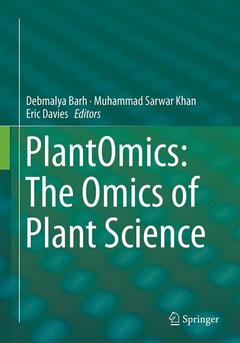PlantOmics: The Omics of Plant Science, 2015 The Omics of Plant
Coordonnateurs : Barh Debmalya, Khan Muhammad Sarwar, Davies Eric

PlantOmics: The Omics of Plant Science provides a comprehensive account of the latest trends and developments of omicstechnologies or approaches and their applications in plant science. Thirty chapters written by 90 experts from 15 countries are included in this state-of-the-art book. Each chapter describes one topic/omics such as: omics in model plants, spectroscopy for plants, next generation sequencing, functional genomics, cyto-metagenomics, epigenomics, miRNAomics, proteomics, metabolomics, glycomics, lipidomics, secretomics, phenomics, cytomics, physiomics, signalomics, thiolomics, organelle omics, micro morphomics, microbiomics, cryobionomics, nanotechnology, pharmacogenomics, and computational systems biology for plants. It provides up to date information, technologies, and their applications that can be adopted and applied easily for deeper understanding plant biology and therefore will be helpful in developing the strategy for generating cost-effective superior plants for various purposes. In the last chapter, the editors have proposed several new areas in plant omics that may be explored in order to develop an integrated meta-omics strategy to ensure the world and earth?s health and related issues. This book will be a valuable resource to students and researchers in the field of cutting-edge plant omics.
Chapter-1: Omics of Model Plants.- Chapter-2:Instrumental techniques and methods: their role in plant omics.- Chapter-3:Next generation sequencing and assembly of plant genomes.- Chapter-4: Functional genomics: applications in plant science.- Chapter-5: Cytogenomics and mutagenomics in plant functional biology and breeding.- Chapter-6: Plant Epigenetics and Crop Improvement.- Chapter-7: Plant miRNomics: novel insights in gene expression and regulation.- Chapter-8:Plant Proteomics: Technologies and applications.- Chapter-9: Plant Metabolomics: An overview of technology platforms for applications in metabolism.- Chapter-10:Plant Glycomics: advances and applications.- Chapter-11: Plant Lipidomics: Signalling and Analytical Strategies.- Chapter-12: Plant secretomics: unique initiatives.- Chapter-13: Phenomics: Technologies and applications in plant and agriculture.- Chapter-14: Plant Cytomics: Novel Methods to View Molecules on the Move.- Chapter-15:Plant Physiomics: Photo-electro-chemical and molecular retrograde signaling in plant acclimatory and defence responses.- Chapter-16: Signalomics: diversity and methods of analysis of systemic signals in plants.- Chapter-17: Signalome in salt stress.- Chapter-18: Thiolomics: Molecular mechanisms of thiol-cascade in plant growth and nutrition.- Chapter-19: Chloroplast Omics: global strategies for study of plastid biology.- Chapter-20: Transplastomics: A convergence of genomics and biotechnology.- Chapter-21:Plant Mitochondrial Omics: state of the art knowledge.- Chapter-22: Micromorphomics: a morphological dissection to unveil environmental stress.- Chapter-23: Microbiomics: An approach to community microbiology.- Chapter-24: Cryobionomics: evaluating the concept in plant cryopreservation.- Chapter-25: Nanobiotechnology: applications in plant and agriculture.- Chapter-26: Plant pharmacogenomics: from drug discovery to personalized ethnomedicine.- Chapter-27: Machine learning approaches in plant biology.- Chapter-28: Applications of bioinformatics in plant and agriculture.- Chapter-29: Plant system biology: insights and advancements.- Chapter-30: Plantomics and Futuromics.
Debmalya Barh (MSc, MTech, MPhil, PhD, PGDM) is the founder of the Institute of Integrative Omics and Applied Biotechnology (IIOAB), India; a global platform for multidisciplinary research and advocacy. He is a well-known biotechnologist and an active researcher in the field of integrative omics who works with 400+ well-regarded researchers from 40+ countries and has 125+ high-impact international publications, several books, and book chapters in the field of biomedical and agricultural omics. He is a globally branded editor for editing omics related research reference books and an editorial and review board members for a number of highly reputed international journals. Due to his significant contributions in the field and in promoting applied biological, agricultural and bio-medical sciences using unique research strategies; in the year 2010 he has been recognized by Who's Who in the World and in 2014 he has been entered into the Limca Book of Records, “the Indian equivalent to the Guinness Book of World Records”.
A Doctorate from the University of Cambridge, Prof. Muhammad Sarwar Khan is a highly regarded Molecular Biologist from Pakistan who was a founder Head of Biotech Interdisciplinary Division at NIBGE and is currently serving as the Director of Center of Agricultural Biochemistry and Biotechnology (CABB), University of Agriculture, Faisalabad, Pakistan. He has several awards in his credit including Civil Award (Presidential Medal for Technology), Gold Medal in Agriculture (Pakistan Academy of Sciences), Performance Gold Medal (Pakistan Atomic Energy Commission), Biotechnologist Award (National Commission on Biotechnology), and is a Life Fellow of Cambridge Commonwealth Society. He has several high impact publications in scientific Journals including Nature, Nature Biotechnology, and is an author of a number of books and book chapters. Dr. Khan has made colossal contributions in the field of Chloroplast Genetic Engineering and is a pioneer in expre
Provides the most timely, complete, and up-to-date information
Comprehensively covers all aspects of plant omics technology in a single volume
Targeted for a broad spectrum of readers: plant biologists, plant breeders, agriculture scientists, UG and PG students in various fields in agriculture, and agri industries
Date de parution : 10-2016
Ouvrage de 825 p.
17.8x25.4 cm
Disponible chez l'éditeur (délai d'approvisionnement : 15 jours).
Prix indicatif 210,99 €
Ajouter au panierDate de parution : 03-2015
Ouvrage de 825 p.
17.8x25.4 cm
Disponible chez l'éditeur (délai d'approvisionnement : 15 jours).
Prix indicatif 210,99 €
Ajouter au panier


